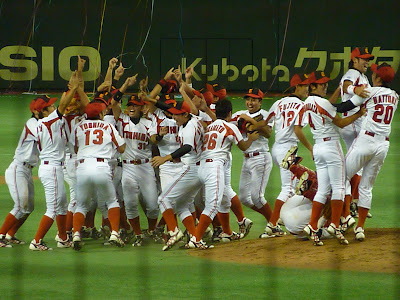After a weekend of watching way too long baseball games in Hiroshima, I decided to return to the Tokyo Dome for the Industrial League's Intercity Championship. I had been to a few of the qualifying games back in June as well as last year's title tilt, and the games are always fast paced and excellent quality.
The Tournament and Teams
As a quick refresher, the Tournament pits 32 teams from all over the country in single knockout form. Most of these are company teams although sometimes an amateur club team makes it. All games are played at the Tokyo Dome over 12 days, with most days having 3 games. The players are generally in their 20s and played university ball although some come straight from high school. Some go on to be drafted by the NPB teams while Jun Tazawa went straight to the Boston Red Sox after his team won the championship two years ago.
Each region has several qualifying tournaments to decide who participates. Once the teams are set, they can receive players on loan from other teams in the same region that didn't make the final cut. I find this a bit peculiar as it seems like stacking the deck for the bigger regions, which have an advantage with more teams from which to choose temporary players.
The Intercity tournament is also famous for the incredible cheering sections. Each team has a dedicated group of employees who double as the cheerleaders and band. They lead the other employees and fans in raucous cheering throughout the game, and there are awards given for those groups that can get the most fans or show the most spirit, among others. These groups are far more enjoyable than the cheering sections that populate the pro games here as they have more variety between the different groups, based on the company or industry.
This year's finalists were Toshiba from Kawasaki, a city in Kanagawa prefecture immediately south of Tokyo. They are traditionally a strong team who have taken 6 titles overall, the last just 3 years ago. Kawasaki is also a strong city in this tournament, having crowned 11 champions since 1973.
JR Kyushu (the Kyushu branch of Japan Rail) was making their 13th appearance in the competition. They won the 1936 title under a different name but that was their only championship.
In Japan, you sit on the same side of the field as the team you are supporting. This leads to some interesting imbalances. Since Kawasaki is so close to Tokyo, Toshiba is able to fill their half of the Dome with their employees. There are 42,000 seats in the entire stadium so Toshiba fans (i.e. employees) probably took 20,000. But JR Kyushu comes from far-away Kyushu, the southernmost island that is several hours away by train. So they had about 3 sections of fans. A bit one-sided but there was plenty of room on their side of the field, so that is where I sat. (There are several sections in the infield seating that are reserved for those who are just baseball fans which cost 2,400 yen. There are also some balcony seats on the second level for 1,500 yen.)
Both cheering sections were loud and proud, but I preferred the JR Kyushu group as they had a shinkansen balloon (above) and were dressed as train conductors during part of the game.
The Game
Both teams had given up just 9 runs in their 4 victories, while Toshiba had scored 20 compared to JR Kyushu with 18. So a low scoring game was expected and that's what we got.
Nonetheless, Toshiba started quickly in the bottom half of the first off Masamitsu Hamano. Rookie Ryoichi Adachi led off with a liner that diving third baseman Yuki Tadakuma couldn't quite corral as it bounced out of his glove for an infield hit. Adachi was sacrificed to second by Masaya Iseki, and scored (below) on a single by Shota Fujiwara (above). Quickly 1-0 Toshiba.
They added another in the 3rd when Adachi again led off with a single, went to second on an Iseki groundout, then to third on a Fujiwara groundout before scoring on a clutch single from Keiji Ikebe, who was on loan from JX-ENEOS, another Kawasaki team that did not make the tournament.
After that, the story was Toshiba starter Takashi Fujita (above). He was essentially unhittable, throwing a combination of breaking stuff and fastballs that kept the JR Kyushu hitters constantly off balance. He allowed only 3 singles (that's Noriaki Utamura getting one below) and no runner even made it to second. Even then, he wasn't overpowering, barely hitting 140 km/h (87mph) on the gun and only notching 3 strikeouts. But he only needed 107 pitches over the 9 innings as the JR Kyushu batters were unable to make solid contact. A great pitching performance to take the title and give Fujita the tournament's MVP award (given to the top player on the championship team).
Adachi went 3/4 and scored both runs; he was one of three players to win the rookie award for the tournament.
Hamano also threw a complete game but was the hard-luck loser. He yielded just 7 hits and 2 walks with 6 Ks but was bested by a superior pitcher. He was awarded the MVP for the runners up though.
The game time was a terrific 2:04 (an extremely fast rate of 1.89 PPM). An excellent display of pitching and defense by both teams made this a hugely enjoyable evening.
After the game, they had the closing ceremonies where awards were given out and speeches made. A rather anti-climatic ending to the tournament.
Next Up
The World Judo Championships are in Tokyo and I'm going to check out a day of it tomorrow. Check back Friday for a post on that.
Best,
Sean





















0 comments:
Post a Comment